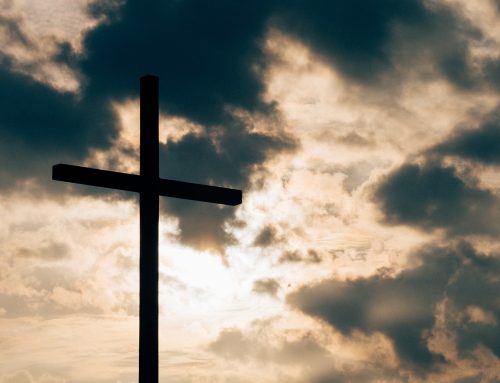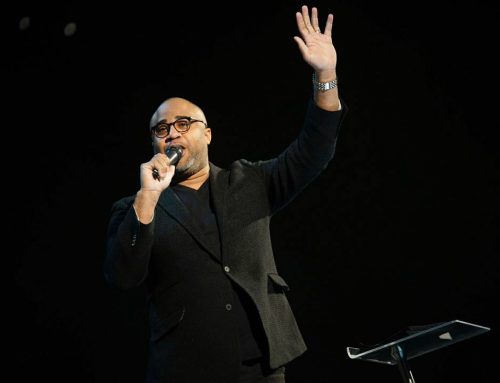When you think about it, Good Friday is an odd name to use to commemorate someone’s death. In Germany they call it Karfreitag — Sorrowful Friday — which seems more appropriate.
But Good Friday is also a joyful day. It’s the day that Jesus bridged the impassable gap between mankind and God.
When we say that Jesus bridged the gap between us and God, it means more than that he died for our sins. Because God became flesh, entered into history, and became fully human, He ceases to be alien to us. The death of Jesus bridged the gap of sin. Both the life and death of Jesus also bridged the gap of holiness.
I stand amazed in the presence
God is holy, which literally means set apart. God is set apart from us. He is different, better, perfect: holy.
“Holy, holy, holy is the Lord Almighty;
the whole earth is full of his glory.”
Isaiah 6:3
R.C. Sproul makes this observation about Isaiah 6: “Only once is a characteristic of God mentioned three times in succession. The Bible says that God is holy, holy, holy. Not that He is merely holy, or even holy, holy. He is holy, holy, holy. The Bible never says that God is love, love, love, or mercy, mercy, mercy, or wrath, wrath, wrath, or justice, justice, justice. It does say that He is holy, holy, holy, the whole earth is full of His glory.”
That passage comes from a vision that Isaiah has of the throne of God. His reaction is telling: “Woe to me!” he says, then continues: “I am ruined! For I am a man of unclean lips, and I live among a people of unclean lips, and my eyes have seen the King, the Lord Almighty.”
“Woe to me! I am ruined!” What a reaction to coming into the presence of God! But this isn’t the way it was meant to be.
A sinner, condemned, unclean
Scripture tells us that we are made in the image of God — that each of us bears a resemblance to God. The story of Adam and Eve tells us that we were made to be close to God, to walk in relationship with Him, but that sin separates us from Him. Sin causes shame and guilt; we hide from His gaze; we cannot even bear to look at Him.
God is love. He is the creator of all life. And yet, He is so set apart, so completely other, so holy that we can’t even look at Him. He tells Moses in the book of Exodus, “You cannot see my face, for no one may see me and live.”
This is a dire situation. Our creator who deeply loves us and made us in His image now appears so utterly different and set apart that we cannot even look at Him. He seems almost entirely foreign to us.
It’s not just that sin separates us from God: we can’t relate to God. We have no way of understanding God and often our response to God is fear. Not the fear of God talked about in scripture that leads to reverence, but fear of something so awesome and different and terrible that we cannot comprehend it.
His face I at last shall see
When Jesus stepped into history and was born as a helpless baby some 2000+ years ago in Bethlehem, it was extraordinary. The creator of the universe became part of His creation. The all-powerful God set aside that power for a life of a servant. The vast, almighty, unknowable God became something understandable: human.
In Jesus Christ, we can see God without fear. Jesus told his disciples, “Anyone who has seen me has seen the Father.” The God whose face Moses could not look at without dying is now speaking face-to-face with humanity.
[inlinetweet prefix=”” tweeter=”” suffix=”#goodfriday”]The God whose face Moses could not look at without dying is now speaking face-to-face with humanity.[/inlinetweet]
The author of Hebrews tells us just how amazing it is that we have a God who became like us: “For we do not have a high priest who is unable to empathize with our weaknesses, but we have one who has been tempted in every way, just as we are—yet he did not sin.”
We have a God that empathizes with us, and we can know that He empathizes with us because He has walked in our shoes. God became flesh and lived among us, was tempted like us, ate and drank like us, laughed like us, and cried like us.
And, like us, He died.
Take a moment to think about that: we have a God who died.
How marvelous! How wonderful!
God loves us and sent His Son to die for us. He also empathizes with us, as His Son died with us. When we come into His presence, our reaction is no longer to cry out, “Woe to me! I am ruined!” but to exclaim, “How marvelous! How wonderful!”
Because God is omniscient, we can have an understanding that He knows what it’s like to be human. It’s quite another thing to know for certain that God knows what it’s like to be human because He literally lived and died as a human, experiencing life in all its beauty and ugliness.
In Jesus, God is still holy, but He’s no longer unrelatable. He’s still holy, but He made it so he was no longer set apart. He stepped across that gap that we could not pass. He made Himself one of us.
God with us: Immanuel.
[inlinetweet prefix=”” tweeter=”” suffix=”#goodfriday”]In Jesus, God is still holy, but He’s no longer unrelatable.[/inlinetweet]
As you contemplate the crucifixion of Jesus Christ this Good Friday, stop to consider what it means that Jesus is both fully man and fully God, bridging the gap of holiness.








Leave A Comment